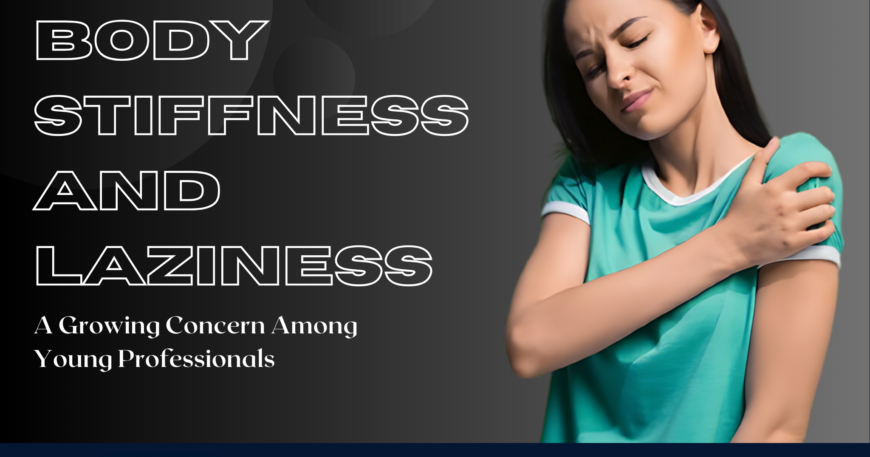
Body Stiffness & Laziness: A Growing Concern Among Young Professionals
In today’s fast-paced world, the demands of corporate jobs have left many young professionals battling with body stiffness and a constant sense of laziness. The pressures of desk jobs, long hours of screen time, and minimal physical activity are contributing to these health issues, making it a widespread concern.
This blog post will explore the causes behind body stiffness and laziness, how they impact overall health, and most importantly, how to manage and overcome these challenges.
Understanding Body Stiffness and Laziness
Body stiffness refers to a feeling of tightness in muscles and joints, often limiting your range of motion. It’s especially common in the neck, shoulders, back, and hips—areas that are heavily affected by prolonged sitting or poor posture. Laziness, on the other hand, can stem from both physical and mental fatigue, leading to low energy levels and a lack of motivation.
Common Causes of Body Stiffness in Corporate Jobs
- Prolonged Sitting: Corporate jobs often involve sitting for hours on end. This can lead to poor blood circulation, muscle tightness, and reduced flexibility.
- Poor Posture: Slouching at the desk or hunching over a laptop strains the spine, neck, and shoulders, leading to chronic stiffness.
- Lack of Movement: Corporate environments encourage sedentary behavior, where employees rarely take breaks to stretch or move around. This inactivity causes muscles to become stiff and joints to lose their range of motion.
- Stress and Tension: Deadlines, work pressure, and anxiety often manifest physically, leading to tension in the body, especially in the neck and shoulders.
Common Causes of Laziness
- Mental Fatigue: Overworking the brain can lead to a feeling of constant tiredness, making it difficult to focus and feel energised.
- Poor Diet: Lack of proper nutrition, dehydration, or relying on processed foods can leave you feeling sluggish and unmotivated.
- Sedentary Lifestyle: Minimal physical activity leads to low energy levels and reduces overall stamina, making even simple tasks feel overwhelming.
- Sleep Deprivation: Poor sleep quality or irregular sleep patterns are common in corporate settings, further contributing to lethargy and reduced productivity.
Impact on Health and Well-being
Body stiffness and laziness may seem like minor issues at first, but over time, they can have severe consequences on your physical and mental health. Chronic stiffness can lead to musculoskeletal disorders, joint pain, and even long-term postural problems. Additionally, prolonged periods of laziness, linked to fatigue and low energy, can affect mental health, leading to anxiety, depression, and burnout.
How to Combat Body Stiffness and Laziness
1. Incorporate Regular Movement
One of the simplest yet most effective ways to fight stiffness is to move regularly. Taking short breaks to stand, stretch, and walk around every hour can significantly improve circulation and reduce muscle tightness.
2. Correct Your Posture
Maintaining good posture throughout the day can alleviate pressure on the spine, neck, and shoulders. Using ergonomic chairs, adjusting your desk height, and keeping your screen at eye level can make a big difference in reducing stiffness.
3. Stay Hydrated
Dehydration can contribute to muscle cramps and stiffness. Drinking plenty of water throughout the day helps keep your muscles and joints lubricated.
4. Exercise Regularly
Engaging in regular physical activity is essential for maintaining flexibility, strength, and energy levels. Incorporating stretches, yoga, or even light resistance training can counteract the negative effects of sitting all day.
5. Practice Mindfulness and Stress Management
Stress and tension are major contributors to body stiffness. Mindfulness practices like deep breathing, meditation, or progressive muscle relaxation can help release physical tension and mental stress.
6. Improve Your Diet
A healthy diet rich in fruits, vegetables, and lean proteins can help boost energy levels. Foods high in magnesium, like nuts, seeds, and leafy greens, are known to reduce muscle cramps and stiffness.
7. Prioritize Sleep
Getting adequate, quality sleep is critical for both mental and physical rejuvenation. Establish a regular sleep schedule and create a sleep-friendly environment to ensure that you wake up refreshed and energized.
When to Seek Professional Help
If body stiffness and laziness persist despite lifestyle changes, it may be a sign of an underlying issue. Conditions such as arthritis, fibromyalgia, or chronic fatigue syndrome may require medical attention. It’s important to listen to your body and take action before the symptoms worsen.
Contact ‘My Ortho Centre’ for Help
If you’ve been struggling with body stiffness, chronic laziness, or any other orthopedic concerns, it’s essential to seek professional advice. At My Ortho Centre, we specialize in diagnosing and treating a wide range of musculoskeletal issues. Whether it’s joint pain, posture problems, or stiffness affecting your daily life, our experienced team of orthopedic as well as physiotherapy specialists are here to help.
Contact Us Now
☎️ Phone Number: +917838869744
📧 Email: myorthocentre638@gmail.com
🌐 Website: myorthocentre.com
Conclusion
Body stiffness and laziness are becoming increasingly common, especially among young professionals in corporate jobs. While they may seem like minor inconveniences, ignoring them can lead to more severe health problems. By incorporating regular movement, correcting posture, managing stress, and maintaining a healthy lifestyle, you can reduce the impact of these issues. However, if these symptoms persist, don’t hesitate to seek medical attention from professionals like those at My Ortho Centre.
Your health is your greatest asset—take care of it!
